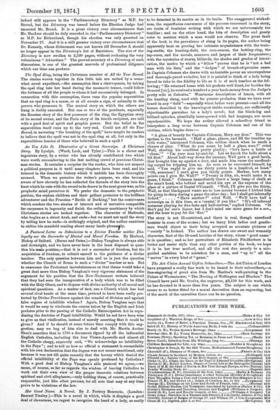Ber Good Name. A NoveL By J. Fortrey Bouverie. (London
: Samuel Tinsley.)—This is a novel in which, while it displays a good deal of cleverness, we regret to recognise the hand of a lady, as easily to be detected in its merits as in its faults. The exaggerated wicked- ness, the superfluous coarseness of the persons concerned in the story, are traits of feminine writing with which we are unfortunately too familiar ; and on the other hand, the bits of description and gossip refer to matters which a man would not observe. The great fault of the book is the prevalence of slang in its pages, the author being apparently bent on proving her intimate acquaintance with the train- ing-stable, the hunting-field, the race-course, the betting-ring, the tap-room, and the morals, manners, and jargon of their frequenters ; with the mysteries of ecart4, billiards, the shades and grades of intoxi- cation, the modes by which a "fellow" proves that he is "not a bad man with his fists," and the "dodges" of broach-of-promise cases. In Captain Coleman she draws with undeniable power an unscrupulous and thorough-paced swindler, but it is painful to think of a lady being forced to take in the fidelity to life as it is of such touches as the fol- lowing; "He returned home with his pockets well lined, for besides the General [sic], be received a hundred a year hush-money from the Judge's pretty wife at Calcutta." Wearisome descriptions of hunts, with all the hunting slang, used with far greater profusion than we have ever heard in any "field "—especially when ladies were present—and all the horses described in the knowingest stable-vocabulary, are sufficiently objectionable garnishes for a lady's novel ; but the black-leg and billiard episodes, plentifully interspersed with bad language, are more reprehensible. We hope the author allowed a schoolboy friend to interpolate a long scene between Captain Coleman and one of his victims, which begins thus:—
" A glass of brandy for Captain Coleman, Mary, my dear." This was spoken to the barmaid. "Half a glass, please, and fill the tumbler up with water," interposed Coleman, who seldom drank when he smelt a chance of play. " What do you mean by half a glass, man ?" cried Wall, showing his condition pretty plainly ; "let's have a bottle of cham.'" "I'm your man by-and-by. Let ns knock the balls about a bit first." About half-way down the passage, Wall gave a good lurch, that brought him up against a door, and made him curse the unoffend- ing carpet for tripping him up. As soon as he recovered himself, he said, Yon ought to give me thirty points in a hundred, at least." "Oh, nonsense ! I can't give you thirty points. Marker, how many points can I give Mr. Wall ?" "Twenty in fifty, sir, would make it a game, 'I think." Coleman immediately threw a large lump of chalk at the man's head, who bobbed and saved his eye at the expense of the glass of a picture of Daniel O'Connell. " Well, rll give you the thirty, Wall, as that blackguard wants me to lose money because I kicked him for going to sleep during a game the other day ; but I shall get infernally
licked." " Have another ?" cried Wall. " We'll have half a sovereign on it this time, or a 'center,' if you like." "It's all infernal nonsense playing for fiye-bobs and half-crowns," replied Coleman. "It don't pay for one's liquor, but I don't mind one more game for a soy., and the loser to pay for the fizz.' "
The story is not ill-contrived, and there is real, though unrefined humour in some of the scenes ; but we fancy Irish ladies and gentle- men would object to their being accepted as accurate pictures of " society " in Ireland. The author has drawn one sweet and womanly character, that of the ill-used heroine of her story, whose "good name' is in question ; and as her portraiture of Elizabeth FitzHerbert is in better and easier style than any other portion of the book, we hope it is in her true method, and all the rest due merely to a mis- guided ambition to be mistaken for a man, and " up to " all the "moves" in every kind of "game."






































 Previous page
Previous page